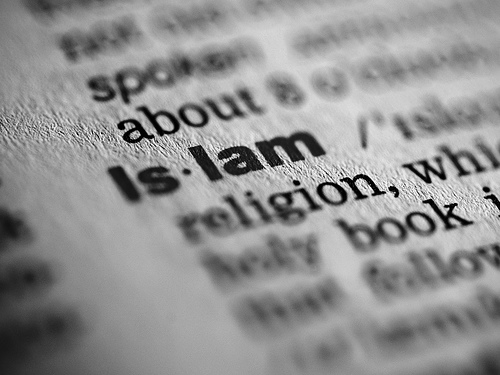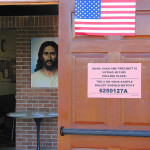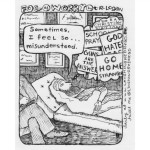We run our website the way we wished the whole internet worked: we provide high quality original content with no ads. We are funded solely by your direct support. Please consider supporting this project.

Is Islam Inherently Violent?
An increasing number of people, especially in conservative Christian circles, are claiming that Islam is an inherently violent religion. They point to all the violence in the history of Islam and all of the violence being carried out by Muslims today as proof of this. I believe this claim is as misguided as it is dangerous.
Two considerations demonstrate the erroneous and prejudicial nature of this claim. First, the percentage of Muslims engaging in violence today is a minute fraction of the total Muslim population, which is now around 1.6 billion (23% of the world’s population). If you add together even the highest estimates of participants in all the Islamic extremist groups (e.g., ISIS, Al Queda, the Taliban, Boko Haram), the total is a fraction of 1% of this population. Claiming Islam is inherently violent on the basis of the behavior of a tiny minority of professing Muslims is like claiming Christianity is inherently racist because groups like the Aryan Nation and Ku Klux Klan profess to be Christian.
Second, if the violence of professing Muslims proves Islam is inherently violent, then consistency demands that we conclude that the Christian religion also is inherently violent, for up until three and half centuries ago, professing Christians routinely engaged in violence that was every bit as barbaric as what Islam extremists are doing today. Beyond the horrific Crusades and Inquisition, there was a century and a half (1524-1648) of almost uninterrupted Christian-on-Christian violence that wiped out a significant percentage of the population of large sections of Europe.
It wasn’t radical extremist groups that claimed to be Christian that carried out this violence. All the violence of this period and throughout Church history was sanctioned by all the major ecclesial denominations and carried out by mainstream professing Christians. To their credit, the only Christians that abstained from this bloodletting were Anabaptists, and they were almost completely exterminated by the other groups. So if, in spite of all this violence, Christians today do not want to accept that the Christian religion is inherently violent, then Christians must stop claiming that the violence of professing Muslims implies that Islam is inherently violent.
Now, some will object that religiously motivated violence on the part of Christians is a thing of the past, proving that the Christian religion is not inherently violent. Thankfully, it is for the most part true that we no longer see Christian organizations carrying out violence. But this is not because Christians suddenly matured three hundred years ago and realized their violence was inconsistent with their religious convictions. Christians only stopped killing their religious and political adversaries because secular authorities decided this relentless warfare was politically and economically disadvantageous, so they agreed to make religious violence illegal (the “Peace of Westphalia,” 1648).
It was at this time that the West thankfully began to finally embrace the idea of a neutral secular state that had been proposed by Thomas Hobbs (1588-1679) and others. While some have tried to argue that the concept of a neutral state protecting the freedom and rights of people of different faiths was birthed out of Christianity, it was actually birthed out of a secular reaction to a century and a half of “Christian” states that were violently trampling on this freedom and these rights. (A good book on this is The Stillborn God: Religion, Politics, and the Modern West, by Mark Lilla).
So you see, the reason why a minority of Muslims continue to engage in religiously motivated violence while Christians do not is not because Islam is inherently violent while Christianity is not. It’s rather because Islamic countries have not, on the whole, embraced the concept of a secular neutral state, outlawing religious violence. In fact, while the secular concept of tolerance has now become deeply ingrained in westerners, I am convinced that, if there were no laws preventing religiously motivated violence, masses of western Christians would still be carrying it out, and I, for one, would likely have years ago gone the way of Michael Servetus!
To close, while I’ve argued that Islam is no more inherently violent than the Christian religion, one could easily turn the tables and argue that both religions, and even all religions, are to some degree inclined toward violence. For as long as people place their ultimate allegiance to a belief above loving other people at all costs, they will feel justified, whenever they deem it necessary, to kill people in the name of their belief.
The only ultimate allegiance that cannot ever lead to violence is the allegiance to the one who commanded his disciples to sacrificially love and do good to all people, including life-threatening enemies (Mt 5:38-47; Lk 6:27-36). Those who share this ultimate allegiance do not adhere to a religion; they rather manifest the Father’s kingdom. And they are grateful for secular authorities that protect them from those who embrace religion, whether it be the religion of Islam or of Christianity.
Image by FirasMT via Flickr
Category: Q&A
Tags: Christianity, Islam, Religion, Religious Violence, Violence
Related Reading

Conservative/Liberal are not Theological Categories
We wanted to repost something by Jonathan Martin today that struck a chord with us about the theological emptiness of political boxes. It’s brief and beautifully written and we hope you’ll read the entire article here. For those of you who are weary of the political tug-of-war for your soul, here’s some hope: And so…

The Philando Castile Verdict
I’m not going to get political. I’m just going to be honest. My heart is pounding. In anger. In sorrow. In fear (over what this might lead to). I know that, unlike the jury, we don’t have all the facts. Got that. But I honestly wonder, what on earth could Philando Castile have done differently…

Repent! … From the Sin of Religion
People often think that being Christian is about “being religious,” but loving others in the way that Christ instructs us is about as far removed from religion as anything could be. Religion, as I use the term, is a system of beliefs and behaviors one embraces as a means of getting life—whether this be feeling…

Cruciform Aikido Pt 1: Jesus and the Violent God
Note: Today, we are beginning a 4-part series on the subject of divine judgement called “Cruciform Aikido.” We will be publishing this once a week alongside Greg’s introduction to ReKnew series. When most people think of God judging sinners, they imagine an angry God who acts violently as he vents his wrath and brings vengeance on people.…


